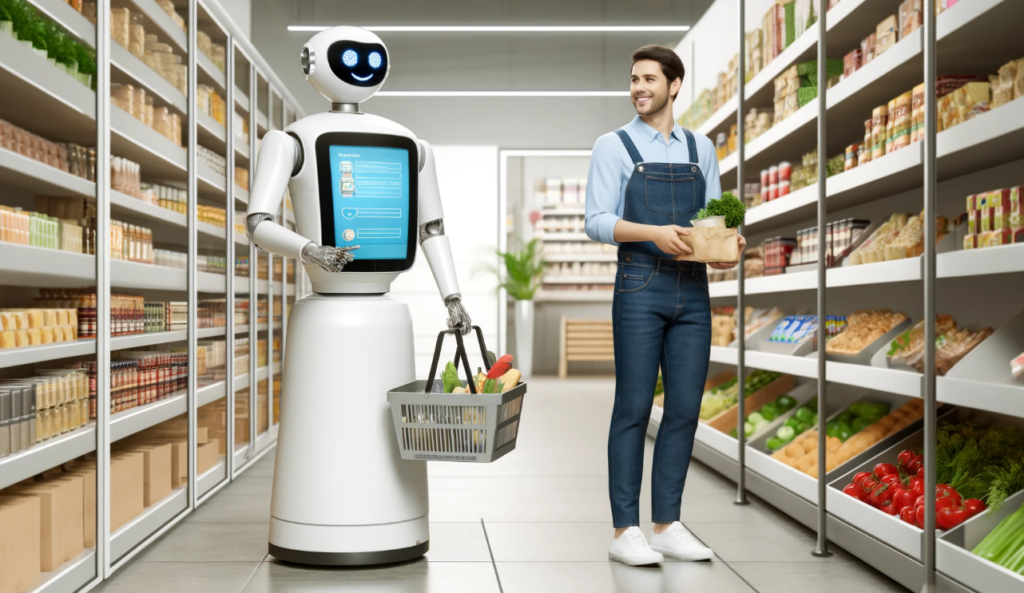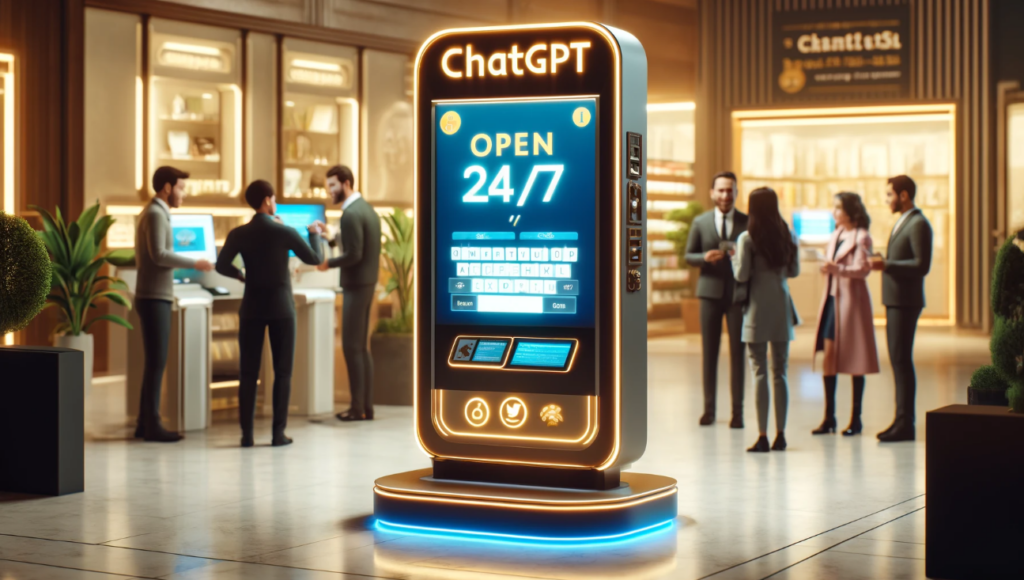In today’s rapidly evolving business world, companies are constantly looking for new ways to improve customer service and increase customer satisfaction. One of the most promising technological solutions is artificial intelligence (AI). Among various AI tools, ChatGPT in customer servive stands out as a powerful tool to revolutionize customer service. In this article, we’ll discuss how OpenAI is enhancing the customer service experience with ChatGPT and what benefits implementing these technologies brings.
ChatGPT for customer service – Speed and Efficiency
One of the key aspects that can be significantly improved thanks to AI is the speed of response to customer inquiries. In a traditional customer service model, where communication relies on human agents, response times can be significantly longer, especially during peak hours or busy periods such as the holiday season. ChatGPT, with its ability to handle thousands of queries simultaneously, eliminates these limitations by offering instant answers to customer queries. For example, for an online store that receives hundreds of questions about product availability, order status or returns policy, ChatGPT can provide answers instantly, regardless of the time of day or night.

Thanks to this, customers receive not only quick but also precise assistance, which significantly increases their satisfaction. When a customer can immediately get an answer to their question, for example about the size of the shoes they want to order or details about how to return a product, they are more likely to make a purchase and recommend the company to others. Additionally, the constant availability of help eliminates the frustration of long waits for a response, which is a common cause of negative reviews and reduced brand loyalty.
In practice, using ChatGPT can also free up human resources that were previously involved in solving simple, routine queries. Employees can focus on more complex and demanding tasks, such as solving complicated customer problems, which further improves the quality of service. For example, a technology company can use ChatGPT to answer basic software installation questions, while specialist technical staff handle more advanced issues that require in-depth knowledge.
Thus, the integration of ChatGPT customer service systems leads to the optimization of business processes, reduced operational costs and the creation of a more flexible and responsive customer service environment. In the long run, such technological innovations can significantly contribute to building lasting relationships with customers, increasing their loyalty and satisfaction.
Personalization and Scalability
ChatGPT customer service is able to analyze data from previous customer interactions, allowing it to deliver more personalized responses. This ability to learn from previous customer interactions allows AI to remember each user’s preferences, shopping habits and specific needs. For example, if a customer regularly asks about gluten-free or organic products, ChatGPT can automatically adjust its responses and recommendations to reflect these preferences, suggesting appropriate products without having to ask for the same information again.

AI can learn customer preferences and tailor its responses in a way that makes each customer feel unique. This makes every interaction more personal and satisfying. For customers who often return to the same online store, this personalization can mean immediately recognizing their needs and offering products that really interest them. For example, if a customer regularly buys baby products, ChatGPT can suggest the latest deals and promotions related to that category in advance, making them more likely to make another purchase.
Moreover, ChatGPT’s scalability allows companies to effectively manage large numbers of clients without the need to hire additional staff. In the traditional model, servicing an increasing number of customers would require employing more agents, which involves additional costs and logistics. ChatGPT eliminates these needs, enabling companies to handle more queries and interactions with fixed resources. For example, an e-commerce company can handle both daily inquiries and a spike in the number of inquiries during sales or holiday promotions, without hiring additional employees.
The scalability of AI allows for flexible adaptation to changing business needs. During peak times, when the number of queries increases rapidly, ChatGPT is able to seamlessly handle the increased number of interactions, ensuring a consistently high quality of service. Outside of peak hours, AI can continue to provide personalized responses, maintaining consistent levels of customer engagement and satisfaction.
An example of such integration was successfully implemented by TTMS in one of the leading automotive companies. This company needed to optimize its sales process by automating the calculation of discounts for various car models. The challenge was to take into account many complex factors, such as model year, engine type, and additional packages. The solution was to develop a PoC (Proof of Concept) using Azure AI and GPT-4, which automatically processed queries regarding vehicle parameters and determined discounts. The AI-powered system allowed the global automaker to manage data efficiently, providing faster and more accurate discount calculations.

Automation of Routine Tasks
Many customer inquiries concern recurring issues or routine tasks, such as resetting passwords, tracking orders, or providing product information. These routine inquiries, while important, can take up a lot of time and resources that could be better used in more complex areas. ChatGPT can automate these processes, answering these common questions quickly and efficiently. For example, when a customer forgets their password, ChatGPT can automatically guide them through the reset process, saving time for both the customer and the service representative.
ChatGPT’s automation of these routine tasks allows employees to focus on more complex and valuable tasks. Instead of wasting time answering the same questions repeatedly, staff can devote their attention to more challenging problems that require a human approach and analysis. For example, complex complaints or requests for special offers can be handled by humans, ensuring a higher level of personalization and customer satisfaction.
Automation of these processes not only increases efficiency, but also reduces operating costs. By enabling ChatGPT to take over simple and repetitive tasks, companies can reduce the number of employees needed for customer service or redirect existing employees to other key areas of the business. For example, a company can reduce costs associated with hiring and training new employees while increasing the productivity of its current team.
Thanks to automation, companies can also improve the quality of customer service. ChatGPT provides consistent and error-free answers to repetitive questions, which minimizes the risk of human errors. Customers receive fast and accurate assistance, which increases their satisfaction and loyalty. Additionally, ChatGPT is available 24/7, which means customers can get the information they need at any time of the day or night without having to wait for staff availability.

Data Analysis and Conclusions
AI, including ChatGPT, can analyze huge amounts of customer interaction data, which allows companies to better understand the needs and expectations of their customers. Thanks to AI’s ability to process and interpret large data sets, companies can obtain valuable information about customer behavior, their preferences and common problems they encounter. For example, analysis of chat and query data may reveal that customers are frequently asking about a particular product or feature, which may indicate the need to make changes to the offer or website.
This allows companies to make more informed decisions regarding business strategy, marketing and product management. Understanding which products are most popular allows you to better plan your assortment and tailor your marketing campaigns. For example, if data analysis shows growing interest in green products, a company can respond by introducing new green product lines and promoting them in its marketing campaigns.
Data analysis can also help identify trends and issues that require immediate attention. AI can monitor and analyze data in real time, allowing you to quickly detect changes in customer behavior or emerging issues. For example, if the number of inquiries about problems with one of its products suddenly increases, the company can respond immediately by analyzing the problem and making necessary corrections. Such quick responses not only improve customer experience, but can also prevent issues from escalating and negative feedback.
Additionally, data collected and analyzed by AI can be used to personalize customer experiences. With a deeper understanding of customer needs and preferences, companies can deliver more personalized offers and recommendations, which increases customer satisfaction and brand loyalty. For example, if AI notices that a customer regularly buys fitness-related products, it can provide them with personalized offers on sports equipment or dietary supplements.
Integration with Existing Systems
ChatGPT in customer service can be easily integrated with existing CRM systems such as Salesforce, allowing you to seamlessly manage customer data and their interaction history. Thanks to this integration, all customer information, such as previous purchases, preferences and communication history, is immediately available in one place. For example, when a customer contacts customer service, ChatGPT can immediately query the Salesforce database to deliver personalized responses that take into account the customer’s previous interactions and purchases. This allows for more effective and personalized support.
Customer service ChatGPT integration with Salesforce and other business tools, such as inventory management systems or e-commerce platforms, allows for even greater automation and improvement of business processes. For example, when a customer inquires about the availability of a specific product, ChatGPT can directly connect to the inventory management system and provide an immediate response about the product’s availability in the warehouse. This eliminates the need for manual checking by employees, which significantly saves time and reduces the risk of errors.
Moreover, integration with e-commerce platforms allows for automatic management of orders and deliveries. When a customer places an order, ChatGPT can automatically enter data into Salesforce, update order status, and generate appropriate notifications for the customer. For example, when an order ships, ChatGPT can automatically send a message to the customer with shipping information and tracking number. This provides the customer with full transparency and updates at every stage of the purchasing process.
ChatGPT integration with Salesforce also enables better data analysis and reporting. Businesses can collect and analyze data from a variety of sources to get a complete picture of their business and customer interactions. For example, data from Salesforce can be analyzed in conjunction with data from e-commerce platforms to identify purchasing trends and customer preferences. Such analysis allows for more informed business decisions, inventory optimization and better marketing planning.
Take the example of an electronics company that integrated ChatGPT with Salesforce. When a customer inquires about the availability of the latest laptop model, ChatGPT searches Salesforce and the inventory management system to provide up-to-date inventory information. If the product is available, ChatGPT can also offer a direct purchase option and update the customer record in Salesforce with new order information. If a customer needs help installing the software, ChatGPT can review previous interactions saved in Salesforce and provide personalized instructions based on the customer’s specific needs.
The future of customer service with AI
Looking to the future, we can predict that AI will play an increasingly important role in customer service. This technology will continue to develop, becoming more and more advanced and precise. Implementing solutions such as ChatGPT is an investment that will bring long-term benefits in the form of increased efficiency, lower operating costs and better customer experiences. It is already clear that some companies are one step ahead of everyone and introduce these innovations faster than the rest.
For example, Amazon and Google are leaders in integrating AI into their customer service systems. Amazon uses AI in its Alexa platform, which can handle customer inquiries, manage orders and provide personalized product recommendations. Google, in turn, is integrating AI into its services such as Google Assistant, which automatically responds to customer queries and helps manage daily tasks.
Over time, AI will increasingly understand context and emotions, which will allow for even more natural and effective interactions with customers. For example, in the future, ChatGPT will be able to not only answer customer questions, but also predict their needs based on analysis of previous interactions and purchases. If a customer frequently buys phone accessories, AI can suggest the latest models in advance or notify about promotions before the customer asks a question. Amazon already takes a similar approach, using customer data to predict their future purchases and offer personalized recommendations.
Moreover, the development of AI will mean integration with even more systems and platforms, which will create a consistent and comprehensive customer service environment. AI integrated with inventory management systems, CRM, e-commerce and marketing platforms will enable smooth exchange of information and automation of many processes. For example, when a customer inquires about the status of an order, ChatGPT will be able to instantly access the relevant data, update the status in CRM and generate a personalized response, improving both efficiency and customer satisfaction. Google integrates its AI with business platforms to ensure a seamless customer experience at every stage of interaction.
Implementing AI in customer service also brings financial benefits. Automation of routine tasks allows you to significantly reduce operating costs. For example, companies can reduce the need to hire additional staff to handle heavy traffic during peak periods such as holidays because AI can easily handle large numbers of requests simultaneously. This not only saves costs, but also allows for flexible resource management. Amazon uses AI to automate logistics and customer service processes, which allows them to operate with unprecedented efficiency.
Better customer experience is another important benefit. AI can provide faster, more precise and personalized service, which in turn leads to increased customer satisfaction and loyalty. In the future, through continuous learning and adaptation, ChatGPT will be able to even better tailor its responses to individual customer needs, which will build deeper relationships and trust in the brand. Google is already using AI to personalize services and support, which significantly improves customer satisfaction.
Conclusions
ChatGPT and other AI tools have enormous potential to revolutionize customer service. Thanks to speed, personalization, automation of routine tasks and the ability to analyze data, AI can significantly improve the way companies communicate with customers. Integration of these technologies with existing business systems allows for even greater streamlining of processes and improved efficiency. Companies that decide to implement AI in customer service can expect significant benefits, both in the short and long term.
We invite you to cooperate with Transition Technolgies MS. Our company specializes in implementing AI solutions and has experience in improving customer experiences.
FAQ – Frequently Asked Questions
What is ChatGPT?
ChatGPT is an advanced artificial intelligence tool that can process natural language and answer user questions quickly and precisely.
What are the benefits of implementing ChatGPT in customer service?
Implementing ChatGPT increases the speed of response to queries, improves the personalization of responses, automates routine tasks and reduces operational costs.
Can ChatGPT integrate with existing CRM systems such as Salesforce?
Yes, ChatGPT can be easily integrated with CRM systems, allowing you to better manage customer data and the history of their interactions.
Can ChatGPT handle large numbers of queries simultaneously?
ChatGPT is able to handle thousands of queries simultaneously, which eliminates limitations related to peak hours or periods of heavy traffic.
Can ChatGPT help you personalize your customer experience?
What types of tasks can ChatGPT automate?
What types of tasks can ChatGPT automate?
ChatGPT can automate routine tasks such as resetting passwords, tracking orders, providing product information, and other repetitive queries.
Can ChatGPT be used by companies from various industries?
Yes, ChatGPT is versatile and can be used in a variety of industries including e-commerce, technology, automotive and many others.
What are some examples of companies that are already using AI in customer service?
Examples of leaders in the use of AI include Amazon with the Alexa platform and Google with the Google Assistant service, which automate customer service and offer personalized recommendations.
How can AI impact the future of customer service?
AI will become more and more advanced, enabling even better understanding of context and emotions, which will allow for more natural and effective interactions with customers.
What are the financial benefits of implementing AI in customer service?
Automation of routine tasks by AI allows you to reduce operating costs, increase efficiency and flexible resource management, which translates into savings and better customer service.